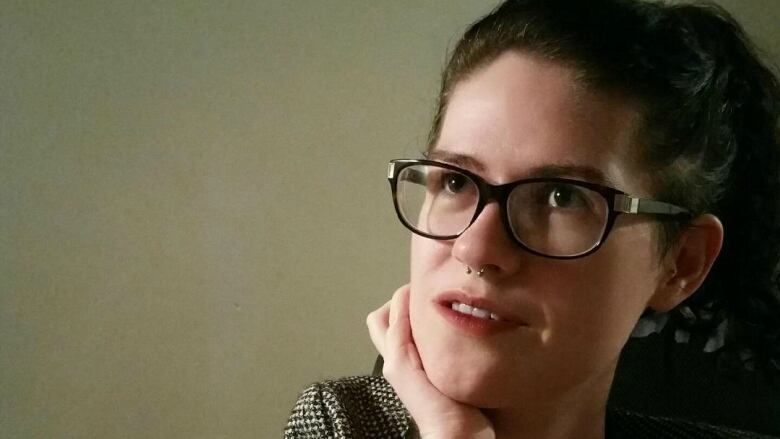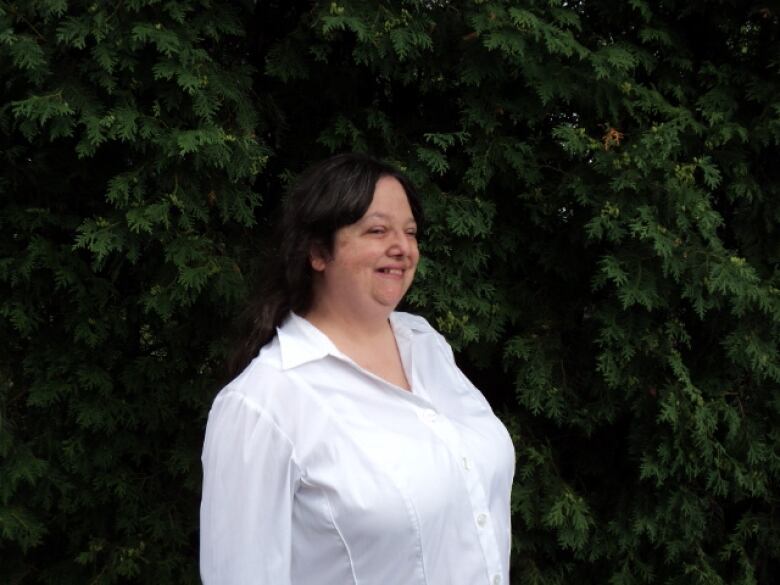Medically assisted death has been legal for almost a year, but another battle is brewing
Government, disability advocates will fight to preserve 'reasonably foreseeable' death requirement

Julia Lambis happy and fulfilled.
The 26-year-old works in her chosen field of fashion marketing, spends lots of time with friends and lives in an apartment with roommatesin British Columbia's FraserValley.
But she's also facing the fact that her body is "in decline" as she continues her struggle with spinal muscularatrophy,a genetic, neurodegenerative disease for which there is no cure. She's never been able to walk, but her range of motion in her upper body and dexterity with her hands has decreased over the years. Even breathing and swallowing were easier when she was younger, she says.
"I know that potentially, given the nature of my disease, it is progressive, so there may come a time where I could be grievously ill and suffering,"Lamb says."Things like not being able to breathe properly and communicate, not being able to write, not being able to use my hands.
Medically assisted dying has been legal across Canada for almost a year.More than 1,300 people across the countryhave chosen that option since it was legalized, CBC News has learned.
But because the timing of her death might not be "reasonably foreseeable" a requirement that's written into thefederal law Lamb says she wouldn't qualify for medical help to die.
As her condition worsens, Lamb worries her disease could force her to suffer for years without killing her.
"Those are all things that bring me a lot of distress and fears."
The one thing that would relieve those fears, she says, is knowing that if that time comes, she can ask a doctor to help her die.
Lamb is notasking to give consent for her potential assisted deathin advance. That's a separate legal issue that doesn't fall under the parameters of her court case. But she does want to change the law so that her death doesn't have to be "reasonably foreseeable" ifshe decides it's no longer bearable to live.
So on June 27 last year, just 10 days after Bill C-14passed and made medically assisted death legal, Lamb and the B.C. Civil Liberties Association (BCCLA) filed a lawsuit against the government of Canadato do just that,saying that the "reasonably foreseeable death" requirement is in violation of Canadians' charter rights.
The federal governmentfiled aresponse defending itself against Lamb's lawsuit last July, but a date for the case to be heard in the Supreme Court of British Columbia has not yet been set. Whenit happens, the legal battle is shaping up to befierce and deeply emotional, as other people with disabilities line up on the opposing side.
"We're actually on the side of government," says Dean Richert, co-chair of the Ending of Life ethics committee for the Council of Canadians with Disabilities.
Before Bill C-14 passed, the council was a vocal opponent to the government's move to legalize medically assisted death. It argued that the law would make people with disabilities vulnerable either through direct coercionor throughsociety's view that living with a disability equals a lesser quality of life to choosing to die prematurely.
Now that medically assisted death is legal, "the genie is out" and the council won't fight to reverse the law,Richert says. Instead, it is focusing its efforts to "keep the vulnerable somewhat safe" on making sure the criteria for medically assisted death aren't broadened.
"At least reasonably foreseeable death is a protection. And we don't want that taken away," he says.
A question of protection?
Amy Hasbrouck, executive director of ToujoursVivant - Not Dead Yet Canada, agrees that fighting Lamb's court challenge is the next frontier in making sure vulnerable people don't feel pressured to die with medical assistance rather than living full lives with proper supports.
A significant risk of broadening the availability of medically assisted dying when death isn't reasonably foreseeable, sheargues, is the"devaluation of the lives of people with disabilities."
"If you're surrounded by people who think that your life is a tragedy because you're disabled, of course you're going to believe that because that's the message that society gives you," says Hasbrouck, who is blind and suffers from severe depression. "Of course you're going to feel like your life is worthless if everyone around you is telling you that."

In its response to Lamb's claim, the Canadian government saysthat section 241.2 of the assisted dying legislation, which outlines the eligibility criteria including reasonably foreseeable death, was included, in part, to protect vulnerable people.
"The objectives of s. 241.2 ... include affirming the inherent and equal value of every person's life without regard to age, illness or disability and protecting those who may be vulnerable to persuasion or influence to take their lives in a moment of weakness or suffering," the court document reads.
But CailyDiPuma, acting litigation director for the BCCLA, says there are safeguards in place to protect against that including physician guidelines around consent and capacity when requesting a medically assisted death. She argues that people with disabilities should have the same right to choose that option as other Canadians.
DiPumaalso says the imposition of the reasonably foreseeable death requirement strays from the Supreme Court ruling (Carter v. Canada) that ordered the federal government to legalize medically assisted dying in the first place.
That ruling stated that competent adults who could give informed consent could "access medical assistance in dying because they have a grievous and irremediable illness and they're suffering intolerably," DiPuma says.
According to DiPuma, a person could be "suffering an illness that is serious that the medical profession cannot help them with and they could be left out of the law if it's going to take a long time for their natural death to occur. So their suffering will persist in the meantime."
Fear of'intolerable suffering'
That's exactly what Julia Lamb is afraid of.
"I feel quite abandoned by [the law]," she says. "I could really become, like,trapped in a state of intolerable suffering and because [death]is not reasonably foreseeable, I would not have an opportunity to alleviate that suffering."
She also disagrees with the argument that medically assisted death perpetuates the view that life with a disability is not worth living.
"I live a great life and I'm very happy. And I do not want to die right now," Lamb says. "But I do want the option to have dignity with death and to be able to alleviate any severe suffering I might come into at the hands of my disability."
"It's a deeply personal decision and it should be mine to make."













_(720p).jpg)


 OFFICIAL HD MUSIC VIDEO.jpg)
.jpg)



























































































